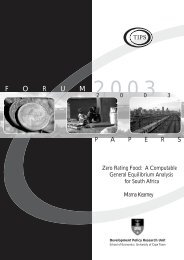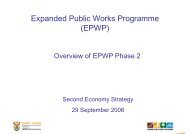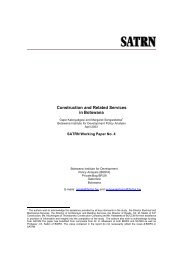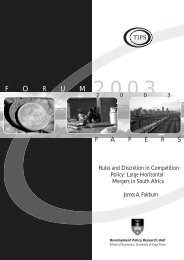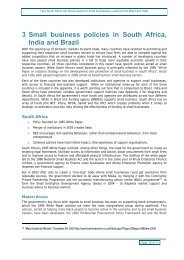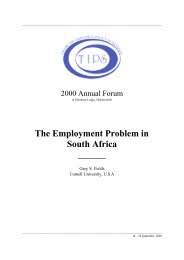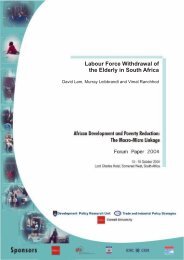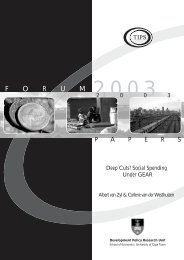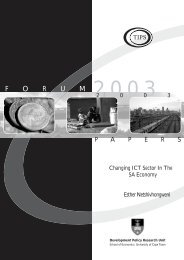Monitor Vol 39 08_Final_Nov08.pdf - tips
Monitor Vol 39 08_Final_Nov08.pdf - tips
Monitor Vol 39 08_Final_Nov08.pdf - tips
Create successful ePaper yourself
Turn your PDF publications into a flip-book with our unique Google optimized e-Paper software.
In policy terms, improving the benefits of biofuels for small farmers would<br />
require:<br />
• continued investment in biodiesel which, on the whole, is more propoor<br />
than ethanol production, does not depend so much on economies<br />
of scale, has lower transportation costs and is already a smallholder<br />
activity;<br />
• continued pro-smallholder policies – for example quotas for procurement<br />
of feedstock from family farms.<br />
8. Knowledge Gaps and<br />
Conclusions<br />
The development of biofuels has potentially important roles to play in<br />
poverty reduction – through employment effects, wider growth multipliers<br />
and energy price effects. There are risks that some of this potential<br />
may be lost as economies of large scale operation kick in, especially with<br />
bioethanol, and as pressure is increased on land access in some settings.<br />
Global environmental incentives to small scale producers remain slight.<br />
The distributional effects of biofuel development are crucial – between<br />
producers and consumers, and between food/feed/energy deficit and surplus<br />
countries. The impacts of biofuels on aid flows from OECD countries<br />
– whether financial or as food – remain difficult to predict. There are some<br />
important global level knowledge gaps – for example biofuel and food<br />
staples prices and stocks need to be tracked, and this data fed into early<br />
warning systems for food security; mechanisms need to be identified by<br />
which climate change mitigation funds might be used to support ‘clean’<br />
biofuels production processing; and how WTO negotiations might affect<br />
biofuels markets and developing countries needs to be identified. On the<br />
whole, however, the types of question outlined in this paper concerning<br />
poverty impacts can only be addressed at country level. Without this it will<br />
not be possible to identify patterns of appropriate feedstocks, production<br />
systems, processing and marketing opportunities, and government roles<br />
that will maximise the impacts that biofuel production could have on rural<br />
livelihoods and poverty. Donors have significant roles to play at both global<br />
and national level with technical and policy support.<br />
51<br />
Trade & Industry <strong>Monitor</strong><br />
Policy conclusions<br />
Of high importance, but unlikely to be achieved in the short term:<br />
• OECD countries need to reduce agricultural support regimes for biofuels to avoid<br />
penalising developing countries who already have restricted access to OECD markets.<br />
• Developing countries need to address the same critical policy, regulatory and public<br />
investment constraints as affect agricultural production.<br />
• Efforts are needed to make staples markets work better to enable switching between<br />
the main staples (maize, rice and wheat) as more maize is used for biofuels<br />
production.<br />
Much of the requirement for policy improvement is at country level, and whilst highly<br />
context-specific, each context is likely to include several of the following:<br />
• Investment in improved land administration systems to deal with conflicting claims<br />
emerging under biofuels expansion.<br />
• Improved market coordination.<br />
• Priority investment for biodiesel which, in many contexts, generates more labour,<br />
has lower transportation costs and simpler technology.<br />
• On plantations and in processing mills, identification of additional non-seasonal<br />
sources of work to avoid highly seasonal employment in biofuels.<br />
•<br />
•<br />
•<br />
•<br />
•<br />
•<br />
•<br />
Improving storage infrastructure (especially in ethanol feedstocks) to lengthen the<br />
processing season.<br />
Investing in feedstocks compatible with existing domestic production patterns to<br />
keep down costs of processing.<br />
Striking a balance in processing capabilities between large, centralised units capturing<br />
economies of scale and smaller, decentralised units, impacts strongly on rural<br />
employment, incomes and economic diversification.<br />
In food insecure countries/regions, focus biofuels investment on non-staple food<br />
crops.<br />
Provide support for small farmers to increase productivity to cope with downward<br />
pressure on biofuels producer prices – for example through improved varieties –<br />
and set quotas for procurement from them.<br />
Depending on context, invest in biofuels feedstocks with higher yields that result<br />
in less competition over land; in those that can be cultivated on marginal lands<br />
and have net benefits for soil rehabilitation; and/or in those that generate the best<br />
multipliers with the wider agricultural and rural economy.<br />
Ensure enforcement of regulations, standards and appropriate technologies to improve<br />
the contribution of biofuels production to climate change mitigation.<br />
Biofuels, agriculture and poverty reduction



